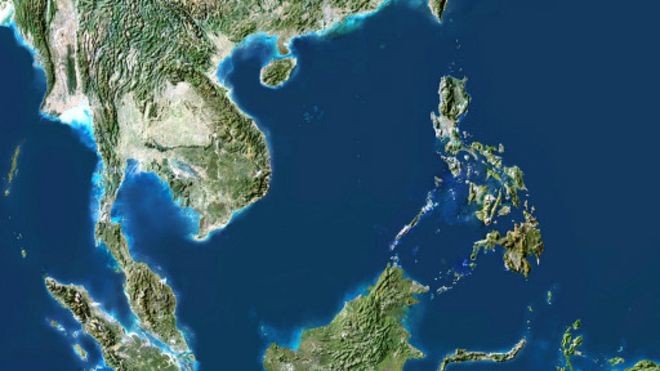Media Report

- The Associated Press reports: "'China is ready to discuss with countries concerned about provisional arrangements pending final settlement of the dispute,' the country's top diplomat, State Councilor Yang Jiechi, said last week. Yang did not describe specifics of the arrangements but said they would include joint development for 'mutual benefits.'...'It is the first time that the idea of provisional arrangements has been proposed as a policy,' said Zhu Feng, executive director of the China Center for Collaborative Studies of South China Sea of Nanjing University. Zhu said such arrangements under UNCLOS could expand the scope of possible activities in which China and other claimants could work together to include not just oil exploitation but the development of fisheries, tourism and other resources."
- Reuters reports: "China's Foreign Ministry on Thursday urged the U.S. Republican Party to stop making 'groundless accusations' against China in its party platform, which says China practices cultural genocide in Tibet and has ludicrous claims in the South China Sea....In an English-language statement issued via the official Xinhua news agency on Thursday, the ministry said the Republican platform contained 'accusations about China on issues related to Taiwan, Tibet, trade and the South China Sea' and are an interference in China's internal affairs. 'All political parties in the United States should view China's development in an objective and rational manner and correctly understand the issues that emerge in bilateral ties,' the ministry said."
- The Wall Street Journal reports: "Southeast Asian foreign ministers will gather here in the coming days with their counterparts from the U.S. and China, making the tiny nation the next diplomatic battleground in a rising standoff over the South China Sea. It will be the first regional meeting since an international arbitration tribunal on July 12 rejected China's claims to most of the South China Sea and its creation of artificial islands....The 10 members of the Association of Southeast Asian Nations whose foreign ministers are meeting here starting this weekend, and the U.S., whose military regularly exerts its right to sail and fly through the sea, have tread lightly in the wake of the tribunal ruling. They have issued reserved statements calling for respect for international law but haven't pushed China to withdraw its claims."
Calendar
- 2016-07-20 Top US admiral says China exchanges conditional on safety
- 2016-07-19 Philippines says it rejected China offer of talks on South China Sea
- 2016-07-18 China to Close Part of South China Sea for Military Exercise
- 2016-07-17 China's urban air quality improves in first half - ministry
- 2016-07-15 China media again touts plans to float nuclear reactors in disputed South China Sea
- 2016-07-14 China’s actions in South China Sea seen as defying ruling
- 2016-07-13 China on Pace to Meet Economic Targets This Year, Premier Says
- 2016-07-12 Beijing’s South China Sea Claims Rejected by Hague Tribunal
- 2016-07-11 China Intensifies Opposition Ahead of South China Sea Ruling
- 2016-07-10 Beijing to make good on investment pledge at EU-China summit
News
- The New York Times China's Calls for South China Sea Talks Face Challenges
- Reuters China upset by U.S. Republican platform on South China Sea, Tibet
- The Wall Street Journal South China Sea Spat Looms Over Asean Meeting in Laos
- Reuters China stipulates no-drug pledge, written tests for Rio-bound athletes
- Bloomberg Business Chinese Private Equity Funds Are Taking on the World's Giants
- The New York Times Unearthing China's Past at a Market Whose Raffish Air Is a Selling Point
- The Wall Street Journal Online Fiction Becomes Chinese Cultural Force
- The Washington Post China's Panchen Lama presides over key Buddhist ritual
- Bloomberg Business Uber Backers Said to Push for Didi Truce in Costly China War
- The Washington Post Wife, son of prominent Chinese dissident arrive in US
- BBC News China floods: At least 75 dead or missing
- The Guardian Sheffield lands billion-pound China deal to create 'hundreds' of jobs
- CNN South China Sea: Beijing calls KFC, Apple protests 'irrational'
Commentary
- The Diplomat US Gives Philippines Warship After South China Sea Ruling
- The Wall Street Journal EU Fears Falling Behind U.S., China In Car Technologies
- Foreign Policy: Tea Leaf Nation Chinese Web Users: Keep the Huddled Masses Out
- The Wall Street Journal: China Real Time More Than 100 Chinese Firms on Global Fortune 500 — but Not Alibaba
- The National Interest China Won't Back Down in the South China Sea
- The Washington Post ISIS recruits from China don't fit a typical profile – and Beijing may be partially to blame
- The Wall Street Journal China Takes Asia Back to the 1930s
